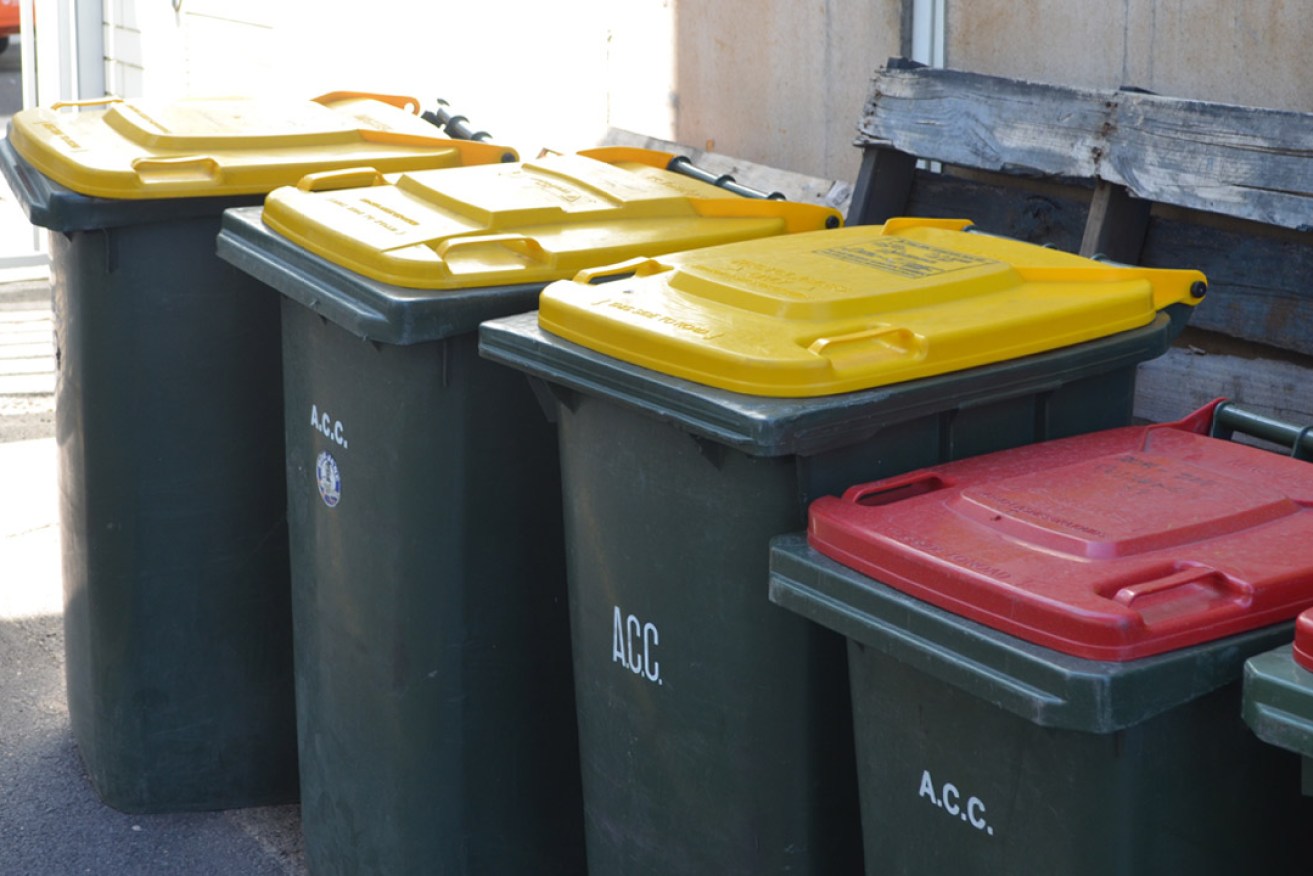Lucas’s bin tax will hit housing industry, builders warn
The state’s building industry has warned the Marshall Government’s contentious new ‘bin tax’ could have a flow-on effect that would “drive up the cost of construction” – at a time the sector is under siege amid a housing downturn.

Council-provided bins outside a city business. Photo: Bension Siebert/InDaily
It comes as the waste collection industry calls for the Government to delay the introduction of a 40 per cent impost that will add millions of dollars to council rates.
Rob Lucas’s budget handed down on Tuesday raised the ire of the local government sector with a surprise cash grab through an immediate increase in the solid waste levy of 10 per cent to $110 per tonne, rising to $140 per tonne from January next year, raising almost $25 million per annum once fully implemented.
Around 392,000 tonnes of municipal waste is currently sent to landfill.
But the impost will also hit private construction companies.
While the recycling recovery rate for construction and demolition waste in SA is above 83 per cent, the sector still sends about 292,000 tonnes to landfill, according to the state’s last published Recycling Activity Survey, prepared by consultant RawTec.
The industry-wide cost would rise from around $29.2 million to $40.9 million within six months.
Master Builders SA CEO Ian Markos told InDaily a $25 million commercial job, such as an aged care facility, would probably have around $60,000 worth of bins on site.
“With these changes, it’s possible there could be a $45,000 cost increase to $105,000,” he said.
“If builders were targeted to recoup this cost increase, they would have to pass that cost on to clients.”
Markos said the association’s members “want to do what they do best: build houses, schools, factories and office buildings, grow the economy and employ more South Australians”.
“It has been disappointing to see Budget measures that will make this harder to do,” he said.
“Master Builders SA fears that a massive increase in the Solid Waste Levy will drive up the cost of construction as well as drive up council rates.
“It is getting near impossible to get your average young person into their own homes due all the add-on costs that keep growing and growing.”
The Local Government Association says councils have advised the LGA that historical Solid Waste Levy increases have been linked with a corresponding increase in illegal dumping, which LGA President Sam Telfer said was “estimated to cost SA rate payers around $10 million each year”.
“Inability or unwillingness to pay is a key cause of illegal dumping,” he said.
“Councils are hit twice with illegal dumping – they have to pay the clean-up costs and then pay the Solid Waste Levy to dispose of the dumped rubbish.”
He called on the Government to increase support to councils and industries “to deal with the escalating issue of illegal dumping”.
The municipal waste collection industry is also seeking more government support, with East Waste General Manager Rob Gregory saying the extra impost “certainly highlights where we need to significantly improve our education, and we need support from the State Government to highlight the importance of appropriate recycling to reduce materials that can be recycled in residential bins”.
“That’s the key – and assistance from the State Government around that needs to be stepped up significantly,” he said.
Asked whether collection frequency could be affected by the changes, he said “any of those measures need to be looked at holistically [but] I think there’s a raft of measures that need to be considered and frequency of collections is something that currently is a constraint”.
But, he added, “it’s not a silver bullet on its own”.
He said East Waste had a “very positive relationship with our councils”.
“They know they’re getting the best value for money, but any impost that’s forced upon us at very short notice and is a significant increase – and a 40 per cent increase is abhorrent – certainly challenges any relationship,” he said.
“But we will have robust discussions around it.”
The board of East Waste will meet tonight.
Brian Cunningham, who chairs East Waste as well as the Northern Adelaide Waste Management Authority, said the levy was a positive “policy lever” without which “you can’t drive waste reform”.
However, “the rate and timing of the increases was pretty out of the blue for us”, he said.
“We need to talk to government about deferring that significant increase, pushing that out until at least July 2020.”
Environment Minister David Speirs told ABC radio today it was “up to individual councils” whether to pass on the impost through increased rates.
“There’s definitely going to be increased costs for councils in the shorter term,” he said.
“Some councils may decide to absorb this cost as has been the case in the past, some may seek to change their budgets and put up council rates but we know that the situation facing us with waste management in South Australia is significant.”
He said the extra cost per household per year would rise to $15 and “while we want to deal with cost of living issues in this state, there is a good rationale for doing this”.
“We’ve got a waste crisis in this state – we see an opportunity to create jobs and deal with big environmental issues,” he said.
“This should drive down the amount of waste going to landfill anyway, which in turn will reduce those costs in the medium to longer term.”
Want to comment?
Send us an email, making it clear which story you’re commenting on and including your full name (required for publication) and phone number (only for verification purposes). Please put “Reader views” in the subject.
We’ll publish the best comments in a regular “Reader Views” post. Your comments can be brief, or we can accept up to 350 words, or thereabouts.
InDaily has changed the way we receive comments. Go here for an explanation.




